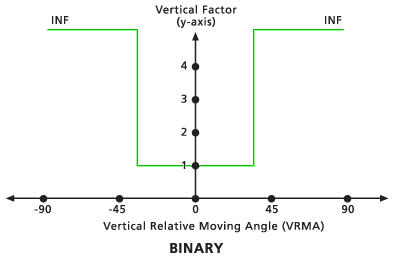Mit der Spatial Analyst-Lizenz verfügbar.
Zusammenfassung
Defines the relationship between the vertical cost factor and the vertical relative moving angle through a binary function. If the vertical relative moving angle is greater than the low-cut angle and less than the high-cut angle, the vertical factor is set to the value associated with the zero factor; otherwise it is infinity.
Bild

Diskussion
The VfBinary object is used in the Spatial Analyst tools Path Distance, Path Distance Allocation, and Path Distance Back Link.
The vertical factor (VF) object defines the relationship between the vertical cost factor and the vertical relative moving angle (VRMA).
VF defines the vertical difficulty encountered in moving from one cell to the next.
VRMA identifies the slope angle between the FROM or processing cell and the TO cell.
When the VRMA is larger than the low-cut angle and smaller than the high-cut angle, the VF for moving between the two cells is set to the value associated with the zeroFactor. If the VRMA is greater than the highCutAngle or lower than the lowCutAngle, the VF is set to infinity.
Syntax
VfBinary ({zeroFactor}, {lowCutAngle}, {highCutAngle})| Parameter | Erläuterung | Datentyp |
zeroFactor | The zeroFactor will be used to position the y-intercept of the binary function. (Der Standardwert ist 1.0) | Double |
lowCutAngle | The VRMA degree defining the lower threshold, below which (less than) the VFs are set to infinity. (Der Standardwert ist -30.0) | Double |
highCutAngle | The VRMA degree defining the upper threshold, beyond which (larger than) the VFs are set to infinity. (Der Standardwert ist 30.0) | Double |
Eigenschaften
| Eigenschaft | Erläuterung | Datentyp |
| zeroFactor (Lesen und schreiben) | The zeroFactor is used to position the y-intercept for the vertical factor class. | Double |
| lowCutAngle (Lesen und schreiben) | The VRMA degree defining the lower threshold, below which (less than) the VFs are set to infinity. | Double |
| highCutAngle (Lesen und schreiben) | The VRMA degree defining the upper threshold, beyond which (larger than) the VFs are set to infinity. | Double |
Codebeispiel
VfBinary example 1 (Python window)
Demonstrates how to create a VfBinary class and use it in the PathDistance tool within the Python window.
import arcpy
from arcpy import env
from arcpy.sa import *
env.workspace = "C:/sapyexamples/data"
myVerticalFactor = VfBinary(1.0, -30, 30)
outPathDist = PathDistance("source.shp", "costraster", "", "", "", "",
myVerticalFactor)
outPathDist.save("C:/sapyexamples/output/pathdistvfb")
VfBinary example 2 (stand-alone script)
Performs a PathDistance analysis using the VfBinary class.
# Name: VfBinary_Ex_02.py
# Description: Uses the VfBinary object to execute the PathDistance tool
# Requirements: Spatial Analyst Extension
# Import system modules
import arcpy
from arcpy import env
from arcpy.sa import *
# Set environment settings
env.workspace = "C:/sapyexamples/data"
# Set local variables
inSourceData = "source.shp"
inCostRaster = "costraster"
# Create the VfBinary Object
zeroFactor = 1.0
lowCutAngle = -30
highCutAngle = 30
myVerticalFactor = VfBinary(zeroFactor, lowCutAngle, highCutAngle)
# Check out the ArcGIS Spatial Analyst extension license
arcpy.CheckOutExtension("Spatial")
# Execute PathDistance
outPathDist = PathDistance(inSourceData, inCostRaster, "", "", "", "",
myVerticalFactor)
# Save the output
outPathDist.save("C:/sapyexamples/output/pathdistvfb2")